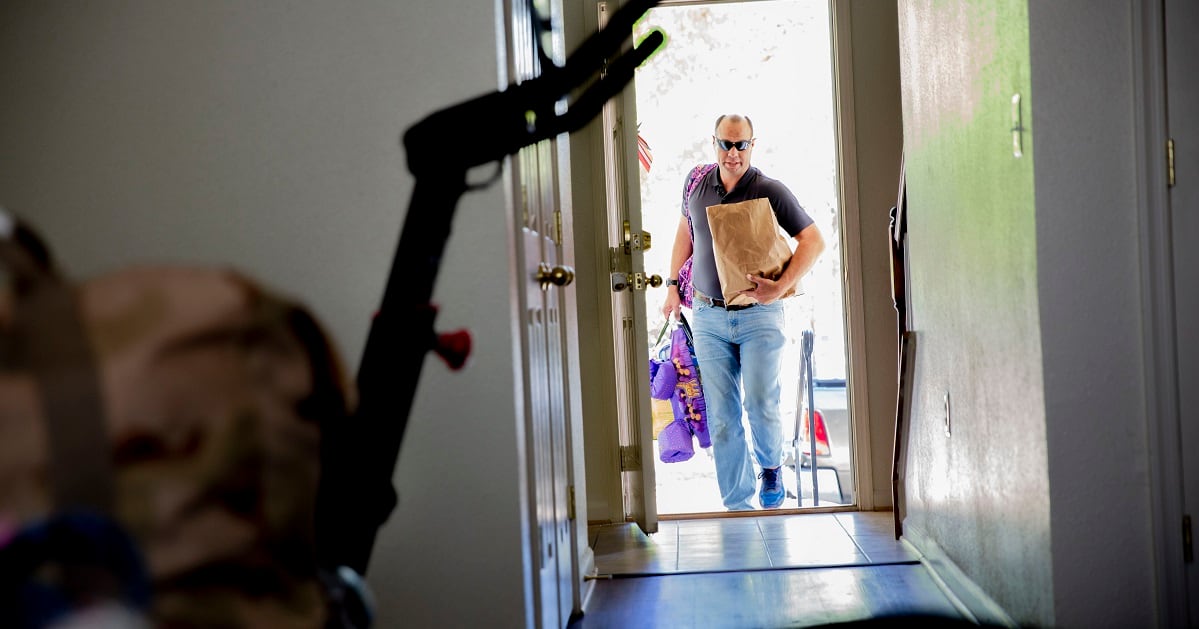Two companies that have been major players in military family privatized housing — Clark Realty Capital and Lincoln Military Housing — have sold their military housing properties.
The Michaels Organization announced Sept. 2 it has bought the eight military housing communities owned by Clark Realty, housing more than 15,000 Army, Navy and Air Force troops and families.
A month later, Liberty Military Housing announced it now owns the privatized housing at 30 military installations — home to more than 36,000 military families — previously owned by Lincoln Military Housing. Lincoln sold the company to its employees, and the name change reflects the new, employee-owned company.
The exit of Clark from the military housing arena is one example of the deeper work being done to improve military family housing and hold companies accountable, said Army Gen. Edward M. Daly, the head of U.S. Army Materiel Command, in an interview with Military Times. AMC was tasked two years ago with overseeing Army family housing and addressing rampant problems with mold, rodent infestations and families’ frustration with Army leadership’s inaction. Similar problems were being experienced by families across the services.
“We put some very, very harsh downward pressure on Clark because they were a failing partner,” Daly said. “We exposed their weaknesses and, quite frankly, I didn’t think they were committed to supporting soldiers and their families. And I told them that.”
He also noted that Clark officials were called to Capitol Hill to testify earlier this year but didn’t show up.
“I think it made them realize they were in a business where they were going to continue to be held accountable — to not only a short-term approach, but a long-term standard,” he said.
While this pressure factored into the Clark-Michaels ownership transfer, it’s not the entire story around the sale of the Clark portfolio, Daly acknowledged. But the Army’s pressure illustrates the increased effort to hold companies accountable.
Regarding Daly’s comments, officials from Clark Realty Capital stated, “Our long record of excellence and achievement has been recognized by federal and local agencies, including the White House under President Obama.”
Clark officials said they are proud of their decades-long history “setting new standards in the Military Housing Privatization Initiative program.”
“From establishing the first town center and charter school on an installation to our innovations in Wounded Warrior housing, environmental sustainability and public-private partnership finance, our work has improved daily life for military families in our communities, and we are honored to have served our nation’s heroes,” officials said in a statement provided to Military Times. “As the communities focus on the long-term operations and maintenance phase of the 50-year partnerships, our expectation is that Michaels, as owner-manager, will continue our commitment of putting military families first, so that service members may enjoy the same quality of life as those they defend.”
Daly said he believes the agreement will work out well for Michaels and for the Army, because of Michaels’ previous work as the property manager for Clark. In addition, Michaels previously owned three privatized housing communities.
One example is the tenant bill of rights. The Army announced in June that 37 installations had implemented all 18 provisions in the tenant bill of rights. The installations that didn’t implement all of those rights — such as a dispute resolution process and mechanism for withholding rent to landlords during disputes — were operated by Clark. Army officials confirmed that all provisions have now been implemented at all its installations’ privatized housing as a result of Michaels taking ownership of Clarke military housing.
Congress mandated the 18 tenant rights in the 2020 National Defense Authorization Act. It was part of comprehensive reform provisions to address pervasive issues with mold, rodents and other health, safety and environmental hazards in privatized military housing.
Frustrated military families testified in 2019 about their inability to get some of the private companies to fix problems and the lack of assistance from military leadership on some bases. Military officials acknowledged they had dropped the ball in terms of their responsibility to oversee privatized housing.
A number of lawsuits about housing conditions have been filed by military families against privatized housing companies, including Clark and Lincoln; these changes in ownership don’t affect pending lawsuits.
A spokeswoman for Michaels said the entire tenant bill of rights was implemented in June at the three communities they previously owned and managed. The remaining rights “were implemented at our newly acquired sites at transition of ownership,” said Laura Zaner, spokeswoman for The Michaels Organization.
Michaels previously owned privatized housing at Fort Leavenworth, Kansas; Yuma Proving Ground, Arizona; and Fort Huachuca, Arizona. The eight properties they’ve acquired from Clark are Liberty Parks at Andrews Air Force Base, Maryland; Harbor Bay at MacDill AFB, Florida; The Villages at Fort Belvoir, Virginia; The Villages at Fort Benning, Georgia; The Villages at Moffett Field/Camp Parks, California; The Villages at Fort Irwin, California; Camp Parks at Monterey Bay, California; and Pacific Beacon privatized unaccompanied housing at Naval Base San Diego, California.
Except for Pacific Beacon, Michaels was the property manager for all the properties previously owned by Clark.
RELATED

What differences will the residents of the newly acquired Michaels’ properties see? Quicker responses and decisions in regard to dispute resolutions, more streamlined communications and more focus on the resident experience, Zaner said.
Army officials are listening to residents more than ever, Daly said. One example is the surveys. He said he knows the 20 worst-performing installations in terms of resident surveys, and he knows the strategies to make them better.
Daly outlined some of the other steps the Army has been taking to hold companies accountable, including withholding some incentive fees to companies at some locations where they weren’t meeting expectations. Last year, the Army withheld $1 million out of the $11 million available in incentive fees “because of a lack of responsiveness in life, health and safety [work orders] across the board,” Daly said.
A big push for the Army has been looking at the long-term viability of the privatized housing projects, Daly said. In the past two years, they’ve contracted with consultants “that crawl all over their financials and look at their long-term debt-capital ratio and the investments they could provide,” he said. While the Army may have had expertise at the beginning of the privatization initiative, he said, “we have to sustain that and have to augment that expertise because industry standards and practices have changed.”
One product of that effort is the $1.1 billion in new investments secured by Lendlease that will result in new home construction, major exterior and interior renovations, as well as demolition of outdated homes. The improvements vary by installation, but are happening or scheduled to happen at Fort Campbell and Fort Knox, Kentucky; Fort Drum, New York; Fort Hood, Texas; Fort Wainwright, Alaska; and Schofield Barracks and Wheeler Army Airfield, Hawaii.
He said Balfour Beatty is soon expected to announce more investment in its properties.
In the past 10 years, he said, there has been virtually no new capital investment outside the companies’ reinvestment accounts that are used to fund major renovations and replacements of housing. Service members’ Basic for Allowance, which the companies collect for rent, are used partially to fund the reinvestment accounts, as part of the overall operations of the communities.
So, with potentially up to $2.9 billion between new investments and the reinvestment accounts, the Army expects about 20,000 homes will either be renovated or replaced — out of the 87,000 across the Army — by 2025, Daly said. “This plays the long game, as opposed to the short-term approach.”
For more than two years, the Army has been working to more closely monitor its privatized housing, from the installation level all the way up the chain of command. Day to day, the senior command and garrison commander hold the privatized housing partner company accountable, Daly said. Army officials meet with the companies on regular basis, to include weekly meetings with Installation Management Command, and Daly meets with them every six weeks. In additional sessions, they talk about the investment portfolio, long term approach and changes to housing inventory.
He also has the company executives “on speed dial,” he said, and talks to them on a regular basis.
Liberty Military Housing now owns the 30 privatized military housing communities previously owned by Lincoln Military Housing. The one exception is the housing at Fort Sam Houston, Texas, which was transferred to Hunt Military Communities.
“The majority of LMH properties are concentrated on the East and West coasts, and with Hunt already the largest provider of military housing in the San Antonio area, this transaction made sense for both parties,” said Brooke Scarbrough, spokeswoman for Liberty Military Housing.
In December 2020, the owners sold their partnership shares to the LMH employees through an Employee Stock Ownership Plan, while keeping in place the current operational leadership, she said.
The transfer was tied to a continuity plan and provides a benefit to their team members, many of whom have a military affiliation, she said. This employee-owned company is the first in the military privatized housing arena and the largest in the multi-family housing industry, she said.
“We believe this transition marks an even more beneficial change in how our employees own the delivery service to our residents,” Scarbrough said. “We know that our employees are passionate about working for us because of who we serve, military families. We hope that by providing a vested interest in our work, our employees will feel even more empowered to provide the best service in the industry.”
She said officials hope that the change inspires others, including military spouses and veterans, to consider a career with Liberty.
Karen has covered military families, quality of life and consumer issues for Military Times for more than 30 years, and is co-author of a chapter on media coverage of military families in the book "A Battle Plan for Supporting Military Families." She previously worked for newspapers in Guam, Norfolk, Jacksonville, Fla., and Athens, Ga.





